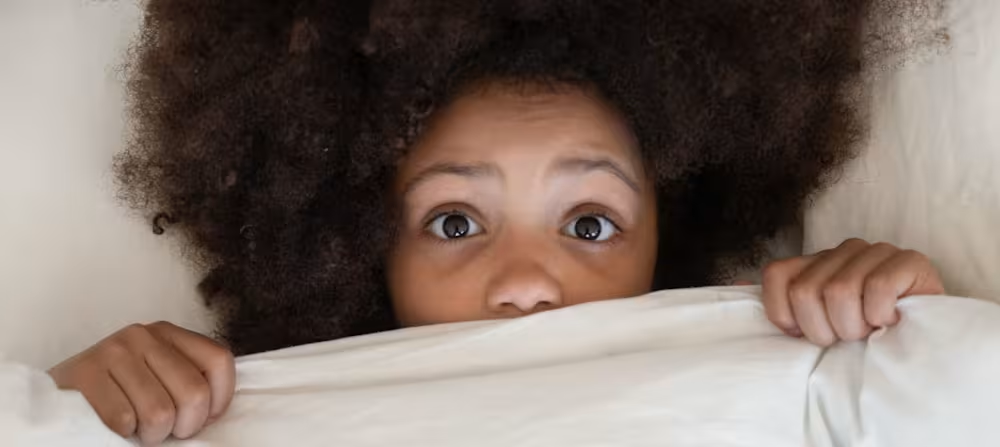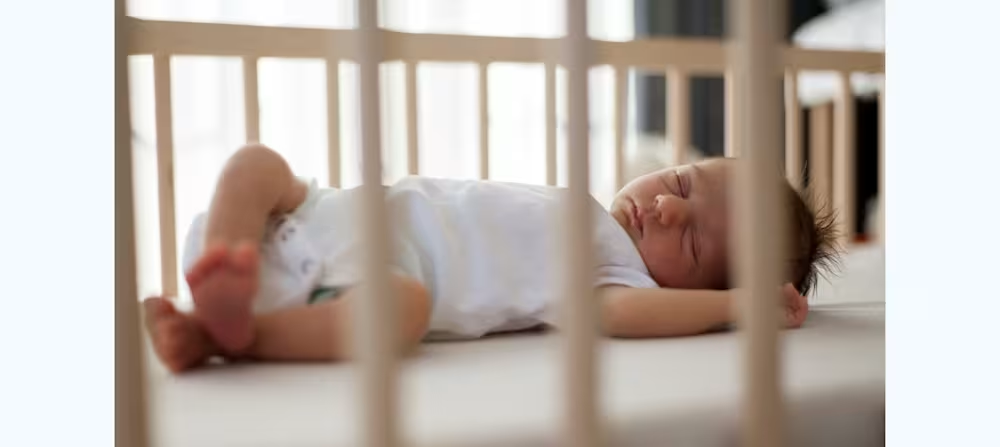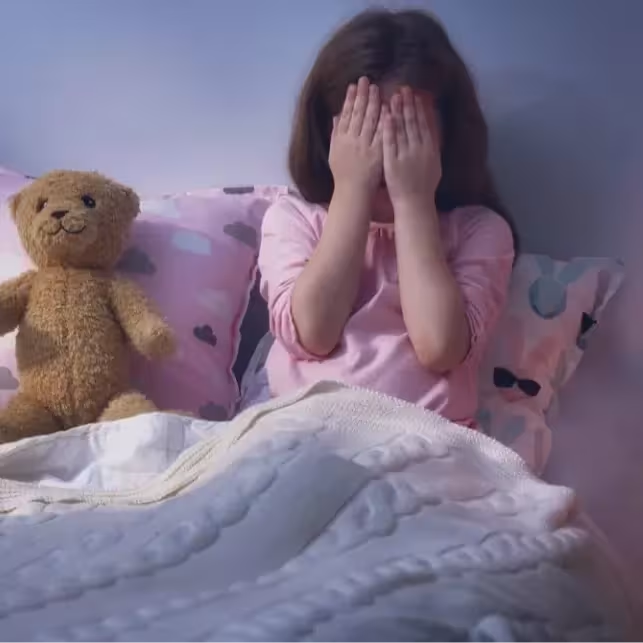Can an ear infection cause a sleep regression?
Updated Oct 16, 2025

Is your child having trouble sleeping yet again? As your child grows and develops, there are a plethora of things that can make it difficult for them to sleep, like , illnesses, and, yes, ear infections. Ear infections occur most commonly [] in kiddos between 6 months and 2 years and they often impact that precious sleep.
In this article, we’ll help you understand how ear infections can lead to poor sleep, explain the relationship between ear infections and sleep regressions, and give you tips on how you can help your baby or toddler feel more comfortable when they have an ear infection.
Reasons ear infection disrupts sleep
There’s no doubt about it: ear infections can be painful. If your child has an ear infection and won’t sleep, it’s usually for good reason. Ear infections [] can cause ear pain, fever, fussiness, irritability, rubbing or tugging at the ear, headaches, nausea, trouble hearing, and difficulty sleeping. Lying down on a flat surface can make the pain worse because it causes the pressure in the ear to increase, which can make it difficult for children to sleep. The nausea and headaches caused by ear infections can make sleep trickier, too.
The fever that tends to accompany ear infections can make sleep difficult as well, especially during overnight sleep since fevers tend to rise at night. This is due to decreased levels of cortisol in our bodies at night that allow white blood cells to detect infections more easily [].
Sleep regression or ear infection: How to tell the difference
We define a “sleep regression” as sudden worsening of sleep patterns. This may look like an increase in crying and fussing during sleep times, having a hard time settling for sleep, increased night waking, taking short naps, and skipping naps entirely. Sleep challenges can arise at any time and there are many contributing factors, including ear infections, that may lead to periods of poor sleep. Other factors that may lead to sleep regressions include teething, illness, travel, and developmental milestones.
Can ear infections lead to sleep regression?
So, it’s not quite accurate to think about it as an ear infection or a . Instead, an ear infection can lead to a sleep regression. An ear infection may independently contribute to a sleep regression, and it could also intensify sleep challenges if it coincides with another factor, like travel or teething. However, this is not always the case either! Your child could have an ear infection and sleep just fine.
If you’re trying to figure out if your child’s sleep issues are being caused by an ear infection, keep an eye on their mood and demeanor during the day too. Often ear infection symptoms are also present during awake times.
Signs that an ear infection may be affecting sleep
If an ear infection is contributing to your child’s sleep troubles, you may notice that they scream or cry when you attempt to lay them down. This is because of that pressure and pain that tend to increase while lying flat. You might even notice that your child is more comfortable while being held upright, like when you’re rocking them, and that they are in more pain and discomfort once they’re in their sleep space.
You might also notice that your child wakes at unpredictable times when they have an ear infection. This is likely because they are waking due to pain, rather than due to a sleep association. They might wake in the middle of a sleep cycle because their discomfort has increased due to their position, or they might become more aware of their pain during lighter sleep phases. This might look like waking 10 - 20 minutes after falling asleep and they might struggle to settle back to sleep even when comforted.
Waking due to a sleep association, however, usually happens at predictable times, such as when your child moves between different sleep cycles every 45 - 90 minutes. If they’re waking due to a sleep association, they’re also more likely to fall back asleep when comforted.
It’s also possible that your baby sleeps more frequently [] with an ear infection because their body is working hard to fight off the infection. They might seem more tired during the day, too, especially if their night sleep is disrupted
Other signs that your child may be battling an ear infection include tugging at the ear, fever, persistent ear pain or ear ache, difficulty hearing, and fluid draining from the ear. Most likely, if they have an ear infection, you’ll notice some of these signs during the day as well, even if the symptoms get worse at night. Sometimes the signs can be subtle or you may mistake them for something else, such as a general cold or teething.
If you suspect your child has an ear infection, whether or not it appears to be impacting sleep, it’s a good idea to schedule an appointment with their healthcare provider. They can diagnose an infection and determine a treatment plan.
Indicators of a sleep regression without an ear infection
Sleep regressions aren’t always due to ear infections or illness. If your child has a sudden, significant decline in sleep patterns but otherwise seems well and pain-free, they may be experiencing a sleep regression due to another factor such as mastering a developmental milestone, going through a big life change, or needing a adjustment.
Note that the symptoms of an ear infection can be subtle in some children, so a chat with their healthcare provider can be helpful in determining whether an ear infection is impacting sleep.
Tips to improve sleep during an ear infection
Tip #1: Use appropriate pain relief measures
To help your child feel more comfortable and hopefully get some sleep, consider home remedies like giving them over-the-counter pain relief and fever-reducing medication such as infant acetaminophen or infant ibuprofen before bed. Be sure to chat with your child’s healthcare provider before administering any medication.
While it’s not safe to put a wedge, pillow, or other sleep prop in a baby’s crib, elevating the head of a child who is at least 2 years old with a pillow may help with the pain and pressure []. Warm or cool compresses on the ear may help as well, although some children may not tolerate being still long enough for this type of treatment [].
Tip #2: Give yourself permission to provide more comfort
When you want your child to sleep well, it can feel like a step backwards to provide more comfort at bedtime and beyond. However, when your child is sick or in pain, it’s perfectly OK to hold them, soothe them, and support them to sleep. Once they’re feeling better, then you can get back on track with independent sleep habits and their normal .
Tip #3: Maintain a consistent sleep routine when possible
Having a predictable schedule and routine is helpful for overall sleep, and it can help your child feel more secure. Sticking to your normal routine can also make it easier for your child to return to their normal sleep habits once the infection subsides. If they’re really uncomfortable and not able to sleep, however, it’s OK to do whatever you need to do to comfort them and then get their sleep back on track once they’re feeling better.
When to call a doctor
If you suspect your child has an ear infection, getting a good diagnosis and prompt treatment are important. Contact their healthcare provider if [6]:
Symptoms last more than 2 - 3 days
Your child is under 6 months
Symptoms are severe and or getting worse
They display persistent fussiness or signs of pain
Fluid, puss, or blood are in the ear
You notice hearing loss
Any other red flags when it comes to sleep or their overall demeanor
Takeaway
Ear infections can be painful and can disrupt sleep because the pressure and pain often increase when lying down. Fevers that may come along with ear infections can also be more prevalent at night, making it more difficult for children to sleep.
A good way to tell if an ear infection is a contributing factor in a sleep regression is if the symptoms of an ear infection are present during the day, too. If your child has fever, increased fussiness, and tugging at the ear during awake times, it’s likely that these things are impacting sleep as well.
If you suspect your child has an ear infection, their healthcare provider can provide a diagnosis and prescribe medication if necessary. In the meantime, over-the-counter pain relievers (if age-appropriate and approved by a doctor) and warm or cool compresses can help.
Share article:
Note: The content on this site is for informational purposes only and should not replace medical advice from your doctor, pediatrician, or medical professional. If you have questions or concerns, you should contact a medical professional.
6 Sources
Share article:





